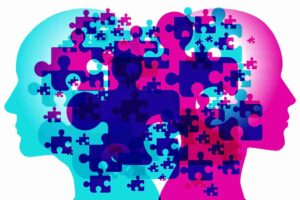Do you feel like something is holding you back in life? Are you struggling to make meaningful connections with others? Relational psychodynamic therapy may be the right treatment for you. This type of therapy focuses on the relationships that we have with others, and how they affect our mental health. It can be incredibly helpful for people who are struggling to connect with others or who feel like they are stuck in a cycle of negative relationships. In this blog post, we will discuss the basics of relational psychodynamic therapy and how it can help you achieve your goals!
Contents
What Is Relational Psychodynamic Therapy?

Relational psychodynamic therapy (RPT) is a type of therapy that focuses on the relationships between people. It is based on the belief that our early experiences with caregivers and other important people in our lives shape our current relationships and how we view ourselves.
RPT can help us understand these patterns and learn new ways of relating to others. It is a collaborative process between therapist and client. The therapist’s role is to create a safe, supportive environment where clients can explore their thoughts and feelings.
Core Principle of Relational Psychodynamic therapy
Relational psychodynamic therapy is based on the principle that our early relationships and experiences shape our lives and how we relate to others as adults.
- The therapist strives to create a safe and supportive environment where patients feel comfortable exploring their thoughts and feelings.
- It works to help the patient understand these patterns and develop new, healthier ways of relating to others.
- It provides an atmosphere of empathy, warmth, and genuineness.
- The therapist will help the patient to identify their defense mechanisms. Relational psychodynamic therapy focuses on current relationships and how they are impacted by past experiences.
- This type of therapy can be helpful for people who have experienced trauma or who have difficulty maintaining healthy relationships.
- If you are struggling in your relationships or feeling stuck is based on the belief that we can change our patterns of relating to others.
If you are struggling with a mental health condition, consider seeking out relational psychodynamic therapy from a licensed therapist.
How Does Relational Psychodynamic Therapy Works?

Relational psychodynamic therapy works by building a trusting relationship between therapist and patient.
- The therapist uses this relationship to help the patient explore their past relationships and how they have affected their current life.
- The therapist will help the patient to understand how their past relationships have shaped their thoughts, emotions, and behaviors.
- They will work together to identify any patterns in the patient’s relationships that may be causing problems in their life.
This type of therapy can be used to treat a variety of mental health disorders, including depression, anxiety, and eating disorders. By exploring the root cause of the patient’s mental health disorder, the therapist can help them to develop coping mechanisms and make positive changes in their life.
If you are struggling with a mental health disorder, consider seeking out relational psychodynamic therapy to help you on your journey to recovery.
Techniques
Relational psychodynamic therapy is based on the principle that our early relationships with our caregivers lay the groundwork for all of our future relationships. This means that if we had positive, supportive, and caring relationships with our parents or other primary caregivers, we are more likely to have positive and supportive relationships with others as adults. If our early relationships were characterized by neglect, abuse, or other trauma, we may have difficulty forming and maintaining healthy relationships as adults.
This therapy seeks to address these early wounds by helping us understand how they continue to impact our lives in the present. Through this understanding, we can begin to heal the wounds of our past and develop healthier relationships in the present.
There are several different techniques that relational psychodynamic therapists may use to help their clients heal and grow. These techniques include:
Exploring early relationships
In therapy, we will explore our early relationships with our caregivers to understand how they have impacted our lives. This exploration can be done through talking, writing, or other means.
Working with transference
Transference is the process by which we transfer our feelings about past relationships onto our current relationships. In therapy, we can work with our transference to help us understand our attraction to certain types of people and develop healthier relationships.
Working with resistance
When we unconsciously block ourselves from understanding or resolving an issue. For example, we may resist exploring a painful memory because we are afraid of what we will find. In therapy, we can work with our resistance to help us move through our fears and toward healing.
These are just some of the techniques that relational psychodynamic therapists may use to help their clients. If you are interested in exploring this type of therapy, please reach out to a therapist in your area.
Benefits
Relational psychodynamic therapy can help you understand and resolve difficult emotions, thoughts, and behaviors. Relational therapy can help people in several ways.
- It can improve communication, build trust, and foster healthy relationships.
- Relational therapy can lead to a more fulfilling and satisfying life.
- Understand the impact of your early relationships on your current life.
- Identifies unhealthy patterns in your relationships.
- Develop a more positive view of yourself.
If you’re struggling in your relationships or simply want to learn more about yourself, consider seeking out relational psychodynamic therapy. It could be the key to a happier and more fulfilling life.
Concerns And Limitations
There are various concerns and limitations:
- One worry is that the therapist could end up getting too emotionally involved with the patient.
- This type of therapy requires a lot of time and commitment from both the therapist and the patient, which may not be realistic for some people.
- Additionally, some people may find it difficult to open up about their innermost thoughts and feelings, which is necessary for this type of therapy to be effective.
Despite these concerns, relational psychodynamic therapy could be a powerful and helpful tool for you. This type of therapy can help you understand and work through your innermost thoughts and feelings. However, there are some concerns and limitations to this type of therapy that you should be aware of before starting treatment.
Discussing your concerns with a qualified therapist can help you decide if relational psychodynamic therapy is right for you. If you are considering relational psychodynamic therapy, it is important to discuss your concerns with a qualified therapist to see if this type of treatment is right for you.
Conclusion
Relational psychodynamic therapy can be a powerful tool for helping people to understand and change their lives. It can help people to explore the relationships between their thoughts, feelings, and behaviors, and to develop more insight into themselves and others. If you are considering seeking therapy, consider finding a therapist who specializes in this approach. With the right therapist, you can achieve significant growth and healing.
For further information and suggestions, please contact Therapy Mantra. We have a team of expert therapists and psychiatrists that can help you overcome this problem. Get in touch with us right away to learn more about our services. You may also make an online therapy session or download our free Android or iOS app.


